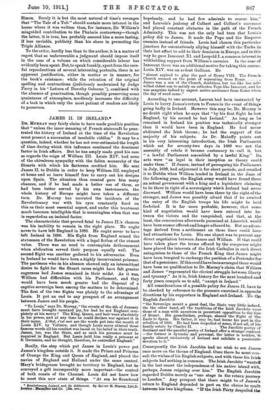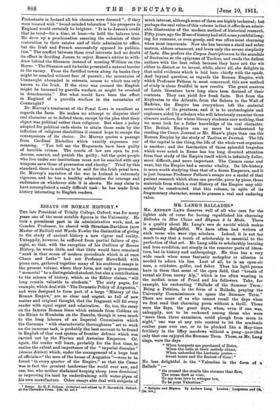.JAMES II. IN IRELAND.*
DR. Mtataar may fairly claim to have made good his position that" unless the inner,meaning of French statecraft be pene- trated the history of Ireland at the time of the Revolution must present a succession of insoluble riddles." It may be a question, indeed, whether he has not over-estimated the length of time during which this influence continued the dominant factor in Irish affairs. -But he has amply made good his case
as regards the reign of William III. Louis XIV. had none of the chivalrous sympathy with the fallen . monarchy of the Stuarts with which his flatterers credited him. He sent James IL to Dublin in order to keep William III. employed at borne and so leave himself free to carry out his designs upon Spain. The situation thus created gave him many chances, and if he had made. a better use of them, or
had been better served by his own instruments, the whole history of Europe might have taken a different' turn. Dr. Murray has narrated the incidents of the Revolutionary war with his eyes constantly fixed on this as their most essential aspect, and under this treatment much -becomes intelligible that is meaningless when that war is regarded as an isolated- factor.
The characteristic that proved fatal to James II.'s chances -was his inability to remain in the right place. -He ought
-never to have left England in 1688. He ought never to have 'left Ireland in 1690. His flight from England armed the statesmen of the Revolution with a legal fiction of the utmost value. There was no need to contemplate dethronement when abdication served their purpose equally well. The second flight was another godsend to his adversaries. Even in Ireland he would have been a highly inconvenient prisoner. 'The partisans who in his absence showed only an intermittent desire to fight for the Stuart cause might have felt greater eagerness bad James remained in their midst. As it was, William had difficulties with his Parliament, and they would have been much greater had the disposal of a captive sovereign been among the matters to be determined. The first of the two flights was plainly to the advantage of Louis. It put an end to any prospect of An arrangement between James and his people.
"To Louis," says Dr. Murray," the events of the4th of January must have brought, unmixed joy, for had he not England com- pletely at his mercy P The King, Queen, and heir were absolutely in his power, and at any time he could declare war against it in their name. Ilitat, c'est enoi are the words put into the month of Louis XIV. by Voltaire, and though Louis never uttered these famous words all his conduct was based on his belief in their truth. James, too, was the State, and as such his presence -must be required in England. But Louis .held him really a prisoner at B. Germains, and he thought, therefore, he controlled England."
the step which put James in Louis's* power put James's kingdom outside it. It made the Prince and Princess of Orange the King and Queen of England, and placed the navies of England and Holland under the same control.
'Mary's bridegroom brought no territory to England, but be conveyed a gift incomparably more important—the control of both coasts of the ChanneL Louis did -not 'know how to meet this new state of things. "At sea. he floundered
• Rcob.jsnjzrv _Ireland _asd...0.4 Settlement. By Ralert -1I-Murray,14A,D. IrOVAlau z, .41X1 CO. DOD,- netj hopelessly, and he had few admirals to rescue him," and Louvois's jealousy of Colbert and Colbert's successor had placed constant .obstacles in the path of the French Admiralty. This was not the only bed turn that Louis's policy did to James. It made the Pope and. the Emperor enemies instead of friends. Louis had chosen this particular juncture for ostentatiously allying himself with the Turks in their last effort to add to their dominion in Europe, and in this way he gave Innocent XI. and Leopold I. a common interest in withholding support from William's enemies. In the case of Innocent there was an additional motive for taking this course. Louis XIV. was an ardent Gallieun. He "almost aspired to play the part of Henry VIII. The French' -- Church seemed on the point of separating from Rome James was a son of the Church, doubtless, but too like her self- willed eldest son to satisfy an orthodox Pope like Innocent, and he was sanguine-indeed to expect Retire assistance from Rome when. the day of need came."
According to one account, Lauzun had been instructed by Louis to hurry James's return to France in the event of things- going badly in Ireland. However this may be, Dr. Murray in no doubt right when he says that "-by his first flight he lost England, by his second he lost Ireland." As long as he remained in Ireland his position was technically stronger than it would have been in England. He bad never abdicated the Irish throne ; he had the support of the majority of his subjects. As Dr. - Mahaffy points . out in his very interesting introduction, the Irish Parliament -which sat for seventy-two days in 1689 was not the assembly of rebels it became customary to vcall it, but "a lawful Parliament assembled by a lawful King." Its. -acts were "as legal in their inception -as • theory could make them." If James, instead of proroguing his Parliament. in July, 1689, had adjourned it for short periods, and recalled it to Dublin when William landed in Ireland in the June of the following year, the English army would have found there an, actual government with a king and a legislature claiming to be there in right of a sovereignty which Ireland had never• disowned. William would have, been there by the right of the stronger, and James was possibly afraid that if Ile awaited the entry of the English troops his life might be held- forfeited. It -is far more probable, however,- that some kind of negotiation would have -been entered into be- tween the victors and the vanquished, and that, at the least, the concessions afterwards proraised_at. Limerick. would have been sooner offered and longer adhered to. But no. advan- tage derived from a -settlement on • these lines could have- had attractions for Louis. His one object was to-prevent-any direct negotiation between James and William. If that could' have taken place the terms offered by the eonqueror might- have placed the interests of the Iriah Cathqlics in such direct . antagonism to those of the French King that James might have been tempted to exchange the position-of a Pretender for.- that of a pensioner. If this could have been arranged there would have been no qualification to Dr..3furray's claim. that Williatn and James "represented the clerical struggle between liberty and tyranny." As it is, Irish history for the next hundred ;and forty years compels us to add, "exeept in Ireland."
All coneiderations of. a. possible policy, for. James IL have to be checked by reference-to the pressure exercised inopposite -directions by his supporters iu England andlreland. ,-To the English 'Jacobite "the Sovereign meant a great deal, the State very little indeed. On the other hand, alt the traditions Of the Irish Jacobite were- -those of a man with ancestors in persistent opposition to the of -Stuart. His grandfather, perhaps, shared the.-flight of the . Earls to Spain. His father, it may be,- had borne his -part in the rebellion of 1641. He had been despoiled,of some? if not all, of big -family estate by Charles II The Jacobite poetry of" Scotland and the parallel-poetry of Ireland offer-a strange contrait —the former is dynastic and personal, the latter is neither,lt • speaks almost exclusively of Ireland and exhibits a passionate' devotion to it."
.Consequently the Irish Jacobite bad no -wish to see Jarmo once more on the throne of England.- Once' there he must con-- sult the wishes of his English subjects, -and with:these his Irish subjects bad nothing in common. TheIrish Jacobite "wantet1 in the last resort the independence, of his native island with, perhaps, James reigning over him." The English Jacobite .regarded Dublin merely as "one stage in the return journey to London." Any prospect that there might 'be of James's return to England depended in part on the -choice he made thetweenkie two kingdoms. 4' If the Irish Pirty.deepoilei. tbe Protestants in Ireland all his chances were doomed "; if they were treated with "broad-minded toleration" his prospects in England would certainly be brighter. "It is to James's credit that he tried—for a time, at least—to bold the balance true. He drew up a proclamation assuring the colonists of their restoration to their estates and of their admission to office, but the Irish and French successfully opposed its publica- tion." The conflict between these rival interests had no doubt its effect in deciding James to reject Roaen's advice to with- draw behind the Shannon instead of meeting William on the Boyne. 'The Shannon and its banks presented a natural barrier to the enemy. From the fortified towns along its banks they might be assailed without fear of pursuit ; the mountains of Connaught abounded in retreats, access to which was only known to the Irish. If the river was crossed the English might be harassed by guerilla warfare, or might be crushed in detachments." But what would have been the effect in England of a guerilla warfare in the mountains of Connaught?
Dr. Murray's treatment of the Penal Laws is excellent as regards the facts. He makes no attempt to disguise their real character or to defend them, except by the plea that their object was political rather than religious. But when a policy adopted for political ends elects to attain those ends by the infliction of religious disabilities it cannot hope to escape the consequences of its choice. Dr. Murray quotes a passage from Cardinal Richelieu which exactly expresses our meaning. "You tell me the Huguenots have been guilty of horrible crimes. The courts of law are open to you. Accuse, convict, and punish the guilty ; but the quiet people who live under our institutions must not be assailed with any weapons save those of persuasion and charity." Tried by this standard, there is nothing to be said for the Irish penal laws. Dr. Murray's narrative of the war in Ireland is extremely vigorous, and he has a healthy admiration for courage and endurance on whichever side it is shown. He may claim to have accomplished a really difficult task : he has made Irish history interesting to English readers.











































 Previous page
Previous page